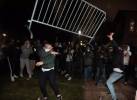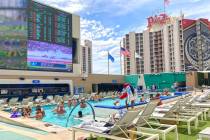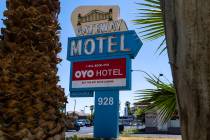Area Briefing
INMATES RELOCATED DURING RENOVATION
OF CLARK COUNTY DETENTION CENTER
Several hundred low-risk inmates are being transferred from the Clark County Detention Center, 330 S. Casino Center Blvd., to the new North Valley Complex, 4900 N. Sloan Lane, to facilitate upcoming renovations at the detention center’s north tower, according to the Metropolitan Police Department.
The relocation effort began Dec. 17 with the transfer of 128 minimum-security inmates, police officials said. As the renovation progresses, as many as 936 inmates may ultimately be relocated to the new facility.
Included in the detention center’s north tower renovation plans are the kitchen and laundry facilities, which were in the north tower basement area. Both of those functions have already been moved to the North Valley Complex, and during the renovation period, laundry and meals will be transported between the North Valley Complex and the Clark County Detention Center three times daily, officials said.
The detention center north tower began operation in 1984 and was originally designed to house 852 inmates.
Before the Dec. 17 inmate relocation, 1,526 people were being housed at the facility. Renovations to the facility will include upgrades to the plumbing, electrical, HVAC and mechanical systems, with the complete project being divided into three phases.
The first phase dealing with the renovation of the basement area is anticipated to be completed within 16 months.
The North Valley Complex, previously referred to as the Low Level Offender Facility, was completed and a certificate of occupancy issued in October 2009. The transfer of inmates into the facility was delayed until due to staffing costs and the current economic situation in Southern Nevada, officials said.
For more information, visit lvmpd.com or call 828-3111.
PARKING AND PEDESTRIAN RESTRICTIONS
IN EFFECT IN KYLE AND LEE CANYONS
Those traveling to Mount Charleston for snow recreation are advised by law enforcement officials to heed parking Nevada Department of Transportation restrictions.
Motorists are not be allowed to park or walk on roadways in Kyle and Lee canyons through March. The Las Vegas Metropolitan Police Department and the Nevada Highway Patrol will enforce the parking restrictions.
Parking will be eliminated on transportation department right-of-way on state Route 157 from state Route 158 to the Mount Charleston Lodge and on state Route 156 from Lee Meadows to the Las Vegas Ski & Snowboard Resort, 6725 Lee Canyon Road, and by the fire station in Lee Canyon.
No-parking signs are to be posted.
Where parking is allowed, including the Resort at Mount Charleston, 2275 Kyle Canyon Road, in U.S. Forest Service parking lots and land and east of state Route 158, vehicles must park in parking spaces or off the road with wheels to the right of the white lines. This prevents damage to vehicles and allows medical, police and fire personnel to respond to emergencies.
Vehicles parked over white lines, in no-parking zones or that impede traffic will be ticketed and towed. Fines begin at $190.
Visitors also are asked to refrain from playing or parking on private property or residential areas or areas marked “closed.” Trespassing fines begin at $150. Snow chains and/or four-wheel drive vehicles may be required for travel on Mount Charleston.
Motorists who stop in travel lanes to put on snow chains will be cited.
SKI & SNOWBOARD RESORT OFFERS
FREE WINTER SPORTS HELMETS
The Las Vegas Ski & Snowboard Resort is partnering with the Centennial Hills Hospital Medical Center to provide free ski helmets to local kids in conjunction with Lids on Kids, a national ski and snowboard safety education program.
The Lids on Kids program is set for 9:30 to 11 a.m. every Saturday through Jan. 28 at the resort, 6725 Lee Canyon Road on Mount Charleston.
For more information, visit lidsonkids.org, skilasvegas.com or call the resort at 645-2754.
Last year, the resort gave away about 300 helmets to local youths. The program, in its fourth year, has provided about 800 local youths with ski and snowboard helmets. This year, the resort anticipates it will donate another 300 to 350 helmets to valley children.
Specially trained Lids on Kids program volunteers will fit toddlers through pre-teens for a helmet. Then, kids and parents will participate in a short education program to learn and understand the skier/snowboarder code of safety and responsibility. Organizers stressed the importance of helmets fitting properly to provide adequate protection.
The Lids on Kids campaign coincides with the National Ski Area Association’s Safety Week, which takes place Saturday through Jan. 24 and aims to promote resort safety education and increase slope safety.
A report by the U.S. Consumer Product Safety Commission published in 1999 concluded that wearing a helmet while skiing or snowboarding could prevent or reduce the severity of 53 percent of head injuries in children younger than 15. The proportion of skiing and snowboarding head injuries is higher in children than in any other age group, so it becomes particularly important for kids to wear helmets, officials said.
FREE RADON TEST KITS TO BE DISTRIBUTED
AT AREA AWARENESS PRESENTATIONS
Community awareness presentations regarding the radioactive gas radon are planned in January and February at valley libraries.
The free sessions are set for:
n 12:30 to 1:30 p.m. Saturday at the Clark County Library, 1401 E. Flamingo Road.
n 11 a.m. to noon Jan. 28 at the Windmill Library, 7060 W. Windmill Lane.
n 11 a.m. to noon Feb. 25 at the Centennial Hills Library, 6711 N. Buffalo Drive.
Attendees will receive a free radon test kit for their homes. Testing for the gas is encouraged by the University of Nevada Cooperative Extension and the Nevada State Health Division.
Winter is the ideal time to test for radon as most homes are kept closed up for the winter, said Laura Au-Yeung, the southern area radon program coordinator for the cooperative extension. The test takes two to four days to conduct.
The leading cause of lung cancer for nonsmokers is radon, experts said. Although smokers have a higher risk of radon-induced lung cancer than nonsmokers, about 21,000 people die each year in the U.S. of lung cancer caused by indoor radon exposure. The radon health risk is highly preventable, yet few people know about the radon risk or have their homes tested for it, according to valley officials.
Radon comes from the natural decay of uranium in soil and enters homes through foundation cracks, openings and some of the porous materials used to construct foundations and floors of homes. It is an odorless, colorless, invisible gas that can reach harmful levels when trapped indoors. Radon can enter any home, old or new.
For more information, call
Au-Yeung at 257-5550, e-mail her at au-yeungl@unce.unr.edu or visit radonnv.com. Any professional or community group that wishes to schedule a radon awareness presentation also may contact
Au-Yeung.
AARP PLANS DRIVER SAFETY CLASS
An AARP driver safety class is planned from 11:45 a.m. to 4 p.m. Jan. 17 at the H2U MountainView office at 3150 N. Tenaya Way, Suite 114.
The cost is $12 for AARP members (AARP membership card required) and $14 for nonmembers. Only checks are accepted as payment.
Attendees this can receive a discount on their automobile insurance. Class size is limited to a first-come, first-served basis.
For more information, call 233-5474.


















